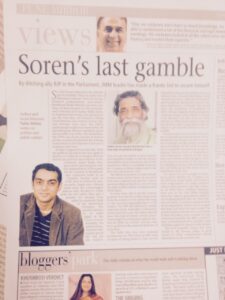So, did Guruji really press the red button by mistake? Does he really have Alzheimer’s disease? Does he not understand parliamentary procedures? These are the excuses the Jharkhand Mukti Morcha has been trotting out for Shibu Soren’s extraordinary volte-face in Parliament last week. Lest anyone forget, the man they call Guruji is a sitting Chief Minister and a former Union Cabinet Minister twice over. The JMM’s spokespeople might have been better off just stating the obvious: ambition, greed and possibly fear of the CBI. Remember, the 1994 murder of Soren’s private secretary Shashinath Jha is being heard afresh in the Supreme Court and a hearing is due soon.
It wasn’t supposed to be like this. With the political calculators out once again in Ranchi, it is difficult to imagine that the Sorens are political descendants of the scholastic Jaipal Singh who, apart from launching the Adivasi Mahasabha in 1938 to push for the creation of Jharkhand, also captained India to an Olympic hockey gold in 1928. Sent to Oxford by missionaries, Jaipal was a Munda tribal from the Chotanagpur plateau who decided to resign from the ICS rather than pay a penalty for missing term while he captained India at the Amsterdam Olympics. The greatest defender of tribal rights in the Constituent Assembly, his spirited interventions ultimately paved the way for the reservation of seats for tribals in government and legislative bodies. It was the Adivasi Mahasabha that turned into the Jharkhand Party which successfully trounced the Congress in Bihar’s tribal areas in the first state elections in 1952.
The different factions of today’s Jharkhand-centric politics have all sprouted from that original seed and the current power jostling in Ranchi is a far cry from the high intellectualism of Jaipal around tribal rights.
In some ways, this is the fate of most popular movements as they degenerate from the romance of the initial ideology to the personal aggrandizement of its leaders. The BSP has followed a similar trajectory from Ambedkar to Mayawati but at least in its case, the cadres and the basic ideological vision remain intact. Soren might have had mass appeal once, but the JMM for a while now has only been guided by the personal fiefdoms of its leaders.
The JMM first shot into national prominence in 1993 when its MPs were accused of taking bribes to bail out the Narasimha Rao government in a no-confidence vote. In undivided Bihar, Soren himself has been called the most pampered politician during the years of Congress dominance. Consider the record since the formation of Jharkhand in 2001. He has resigned under pressure for criminal charges twice before as Union Coal Minister. His first term as Chief Minister in 2005 barely lasted a week and the second ended in ignominy after he failed to get himself elected to the assembly.
Haryana may have invented the politics of aayaram-gayaram but under Soren Jharkhand has turned into the new capital of intrigue and the politics of wheeling and dealing. All this while it continues to languish way down in all development surveys even as Uttarkhand and Chattisgarh, formed at the same time, have shown relative progress. Now, as the balance of power in his own party is shifting to his son, the red button in the Lok Sabha seems like Shibu Soren’s final throw of the dice.
Of course, it is not enough to blame Soren alone. Neither the Congress nor the BJP have clean hands and Soren is only symptomatic of a larger political culture where power is the only currency. In 1998 when Giridhar Gamang’s lone vote in the Lok Sabha brought down the Vajpayee government while he was holding parallel office as Chief Minister of Orissa, it created a political stink about impropriety. Soren’s case is a repeat but there is no stink this time round. The political debate has moved on and there is little discussion now on issues of constitutional morality. The BJP’s cynical U-turn on Jharkhand after initially withdrawing support is typical of this culture.
The now forgotten Jaipal was once hailed as the marang gomke or great leader by tribal communities. Surely, Jharkhand needs another one.
(Author and social historian Nalin Mehta writes on politics and public culture)


